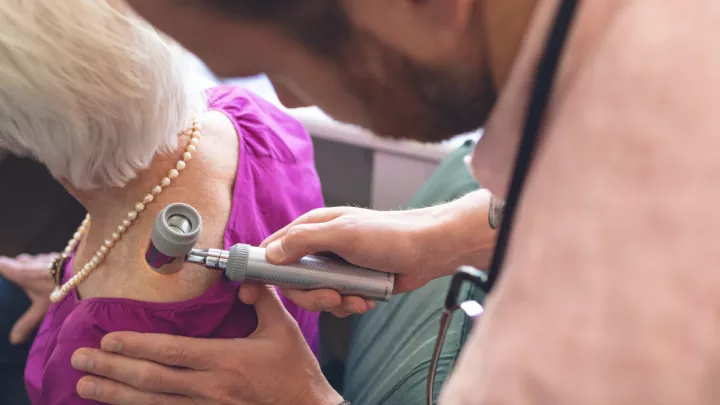Navigating metastatic melanoma with coordinated care and self-advocacy

At 53, Melissa Hays embodies resilience. Her journey with melanoma—a life-changing disease—has been shaped by self-advocacy, determination and the support of a coordinated care team.
Melissa’s fight with skin cancer began in her 30s, when a routine skin check revealed her first basal cell carcinoma, a typically slow-growing form of skin cancer that’s highly curable when diagnosed early. For years, regular checkups became routine, and melanoma never seemed like a real threat—until it was.
That changed in 2017 when Melissa noticed an itchy mole on the top of her head. She assumed it was nothing serious but brought it up during a routine exam with her dermatologist. Her doctor decided to biopsy the mole—a decision that proved lifesaving. The results confirmed melanoma, and further testing classified it as a T3 lesion, indicating the tumor had grown deeper into the skin.
“I remember getting the call as I was walking into work,” Melissa shared. “I never expected to hear the word ‘melanoma.’ That was real cancer. I thought it was just another mole that needed to be removed, but suddenly I felt like my world was spinning, and I broke down crying.”
Melissa’s dermatologist referred her to Nebraska Medicine, where she underwent surgeries to remove the melanoma and sentinel lymph nodes from her neck. Thankfully, the margins were clear, and all sentinel nodes tested negative for cancer. As a result, no further treatment was needed at the time.
A new challenge: Stage 4 diagnosis
In July 2020, Melissa’s journey took a dramatic turn when she suffered her first of four grand mal seizures, each occurring roughly six months apart. Her first episode led to an emergency room visit, where a CT scan revealed metastatic melanoma that had spread to her brain and lungs.
At this critical point, Melissa chose to transfer all her care to Nebraska Medicine specialists to ensure a seamless, coordinated treatment plan.
“I wanted all my doctors in one place,” she explained. “Having a team that worked together was important to me, and Nebraska Medicine gave me that.”
 Her care team included medical oncologist Alissa Marr, MD; surgical oncologist Jason Foster, MD; radiation oncologist Weining Zhen, MD; neurologist Lakshman Narain Arcot Jayagopal, MBBS, and other specialists. Together, they crafted a comprehensive treatment plan, which included 35 rounds of immunotherapy and targeted radiation to shrink her tumors.
Her care team included medical oncologist Alissa Marr, MD; surgical oncologist Jason Foster, MD; radiation oncologist Weining Zhen, MD; neurologist Lakshman Narain Arcot Jayagopal, MBBS, and other specialists. Together, they crafted a comprehensive treatment plan, which included 35 rounds of immunotherapy and targeted radiation to shrink her tumors.
During her journey, Melissa faced another unexpected challenge: she required a lumpectomy to address a separate health concern. The Nebraska Medicine Women’s Health team seamlessly coordinated this aspect of her care, further highlighting the benefits of multidisciplinary care.
Through it all, Melissa leaned on her family and friends. They rallied around her, attending appointments and offering prayers and support.
“I had faith, a positive attitude and a solid support system, but I am also stubborn,” she said. “I refused to even consider not fighting, and I think that’s what got me to where I am today.”
The power of coordinated care and self-advocacy
Today, Melissa’s scans show stability. Her tumors have significantly shrunk, and she has been seizure-free since Dec. 25, 2021. While she continues follow-up care, she is passionate about using her experience to raise awareness about the realities of melanoma.
“People tend to think skin cancer isn’t something to worry about, but I had it, and it went to my brain,” she said. “Your skin is your largest organ, and it plays a much bigger role in your health than most people realize.”
Melissa credits her Nebraska Medicine care team for guiding her through every step of treatment.
“Everyone I encountered—from the nurses to the people who drew my blood—was incredible,” she said.
Melissa’s proactive approach to her health also played a key role in her experience.
“I made it a point to do my own research,” she said. “Being informed helped me ask the right questions and collaborate with my doctors and nurses to make the best decisions for my care, like finding the seizure medication that worked for me.”
Melissa is now a patient whose case is reviewed by the Nebraska Medicine tumor board, where doctors study complex cases like hers to advance cancer research and treatment. She shares this advice for others facing similar battles:
“Ask questions, stay informed, and if you can, bring someone you trust to appointments to help you take notes and process everything,” she said. “It makes a big difference.”
Melissa’s journey is a powerful testament to the resilience of the human spirit and the lifesaving impact of expert, coordinated care.
“Cancer doesn’t define you—it’s just a part of your story,” she said. “I always told myself, ‘I may have cancer, but cancer doesn’t have me.’”
Facing a cancer diagnosis?
You deserve a dedicated team by your side. Call 402.559.5600 to schedule a consultation with our cancer specialists.
A second opinion from a Nebraska Medicine Fred & Pamela Buffett Cancer Center specialist can confirm your diagnosis, give you a chance to discuss treatment options or clinical trials, and help you feel more confident in your chosen path forward.







